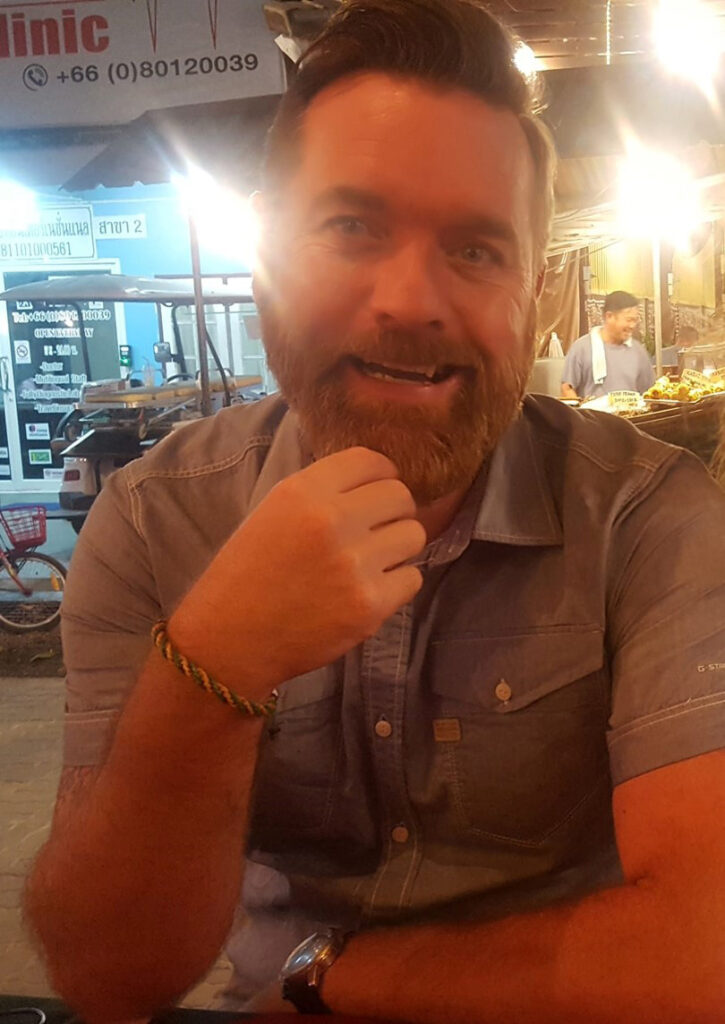by Stephen Greene

Although I’ve stuttered since the age of five I didn’t really feel its impact until my teenage and early adulthood years, that’s not to say the origin of my masking behaviour didn’t start much earlier. I grew up in a working class area of Dublin Ireland, the second eldest in a family of nine kids. My mam raising four under the age of five definitely had her hands full when she noticed my communication difficulties. I wasn’t stuttering at this time at the age of five but was having difficulty with articulation.
Attending speech therapy as a five year old back in 1978 I surmise was a lot different to what it is now. My parents had no involvement in the therapy intervention and were given little feedback on the sessions. About half way through this therapy intervention I started getting stuck on my words and experiencing blocking for the first time. When this therapy was over, my mam said she was handed a page of words for me to practice my articulation but now she had a child that was blocking and repeating his words who started to feel anxious about speaking.
There was little to no information on stuttering at this time that my parents could access to know how to support me but they did the best that they could and life had to carry on. As I said I am one of nine children and our house was a busy one but one with much joy too. The first time that I felt different was in school when I had to read out in front of my class mates. Feeling that anticipation fear, my heart started to beat faster as I counted the kids ahead of me knowing that I was going to get stuck gasping for air, the start of my struggle (everything I did to not stutter!!)
At school even though I was lucky to not experience bullying I had an everyday battle with myself to mask my stutter and strain to appear fluent. One of the cruellest ways that I did this was not saying what I wanted to say when I wanted to say it. I had some success at not showing my stutter but at a cost of starting to lose myself in the process.
Despite this ongoing battle between my stutter and I, I had many moments of joy in my young life, watching Rocky four with my school mates in 1985 and all of us joining the local boxing club to follow in the footsteps of Rocky. The fairytale ended for many as soon as they got a stiff jab to the nose but I loved it and boxing continued to be part of my life for the following ten years into life as a young adult.
Another passion I had was music and my love of synths and keyboards. Just think the late 80’s of classic synth pop like Depeche Mode, the Pet Shop Boys. Piano and keyboard lessons were not on our working class radar so my mates and I working summer and weekend jobs saved up money to buy second hand keyboards and started our own synth band learning the keyboards along the way. What made us stick out from the crowd was that we were all disabled; my stutter and my two band mates had muscular dystrophy. At the time we didn’t know the term ableism but our band was a two finger salute against ablest views. Music and sport was a form of free expression and spontaneity that I didn’t experience when it came to my verbal communication.
The period where I had the most struggles with my stutter was when I was a young adult, my late teenage years. I had speech therapy again as a teenager, what I remember of this therapy was being introduced to more fluency shaping techniques. I had an aversion to this slowed speech which felt so unnatural and did nothing to address the deep seeded unseen inner turmoil that I was experiencing on a daily basis. This turmoil would cause me to leave a queue if I felt there was too many people behind me as my thinking at the time was my stutter would be an unbearable inconvenience on everyone there. I also had this irrational fear of randomly being stopped by strangers and asked for directions and my stutter would be there for all to see. I know it seems a little crazy but that was my life. At eighteen years old I should have been looking forward to what lay ahead, be that in the academic or working world. This was not the case I had the feeling of apathy, why bother!! I was broken, unfixable. I had rejected the idea of university but I had to get a job. I remember vividly it was quite soul destroying handing in my curriculum vitae into businesses and at times my whole body shaking to get my words out. An experience I would repeat many times.
While working in my twenties I had a great circle of friends who got to see behind the veil of the concealment of my stuttering. I could be me, the guy who is curious about people and their lives and enjoyed what we Irish called having the craic, being involved in pure unadulterated fun. Despite this positive aspect of my life concealment and avoidance of my stutter was an engrained everyday occurrence. When you successfully pass as fluent you get a momentary sense of relief at not being found out as a “stutterer” but this is quite fleeting as you know you might not be so lucky the next time and when you are not successful at passing as fluent where your struggle is laid bare, them moments can replay in your mind for hours to days.
In spite of this you can be successful but it’s so much harder than what it really needs to be. I was now thirty one years old and doing well in my career in the area of social care in intellectual disability. I had a fiancé and a young daughter. My stutter though was the elephant in the room that was not talked about especially by me. It came to a head when in work my manager was on annual leave and I was left in charge. I received a phone call and I blocked hard on the name of the centre and the person on the other end presumed I was a person who used services. I regained my composure and said who I was. I went home to my fiancé and cried and said I really have to face this now as I can’t continue to live like this. I reached out to the Irish stammering association and my journey to acceptance started with stuttering support.
I was done running away from what I thought caused me so much pain, I wanted to talk and share and not let my stuttering be the elephant in the room. The great thing about stuttering support is the instant connection that you can feel. I felt like I belonged to something good. Through stuttering support my journey on avoidance reduction therapy started. I heard about a week long residential course for adults who stutter (Dublin Adult Stuttering). I met with Jonathon Linklater one of the speech and language therapists that facilitated the course, he spoke the words of Joseph Sheehan which struck a chord with me “You don’t have a choice as to whether you stutter, but you do have a choice as to how you stutter”. He explained to me that I could stutter openly without struggle and shame. This was the first time that a speech and language therapist gave me the message that “it was ok to stutter”.
On the course we got to watch the Joseph & Vivian Sheehan videos Message to a stutterer and No words to say. I was blown away by the Sheehan’s and their passion for people who stutter. I looked up Vivian when I was finished on the course and I found a phone number for her and I phoned her and she answered! She didn’t know me from Adam, some guy ringing on a Sunday afternoon American time. I enthusiastically shared my story and she was so gracious with her time and had a genuine interest in this stranger ringing from across the globe. It’s a fond memory that I will always have on my journey.
To this day I have friendships that grew out of that week on D.A.S. We were in this stutter bubble like an alternative universe where it felt good to stutter. The challenge was after the course embracing the identity of a person who stutters which meant no longer passing as fluent and showing my stuttering at every opportunity I could. This really changed how I felt about my stutter. I was chipping away at the feelings of shame and difference that had engulfed and overwhelmed me at times. Self acceptance and self advocacy were key components on my journey which led me to taking up a support group facilitator role with the Irish Stammering Association and later I became chair of the association. Having being involved in stuttering support for around eleven years by 2016 I took some time away from the community, it just felt I needed a break.
In 2020 I was feeling enthused again and thought I had something to offer in the community. I got in touch with my good friend Jonathon Linklater who is the development manager of the Irish Stammering Association. It felt good to be back in the fold of stuttering support. In 2021 I started up my own instagram stuttering information& awareness page The Stutterverse where I get to discuss everything stuttering as this really is my passion in life. In 2022 I took the decision to go back into therapy as although I’m quite assured in my identity as a person who stutters I was not happy with the way I stuttered with many secondary behaviours still present in my stuttering pattern.
I got to attend my first international conference in August 2022 when I attended Stammafest in the UK. I cannot overestimate how affirming this conference was, to be surrounded by people who stutter from across the globe. I was with my tribe, my stammering tribe! I got to hear Vivian present with Nick and Ben and Neil at Stammafest on acceptance and change. I thought this was the right time for me to enter therapy again as I was ready for change and to open stutter again.
My journey with ARTS started soon after. I love the group element of ARTS and the value of learning from others. It’s been fun listening to myself openly stuttering. I’m looking forward to what lies ahead on this journey with stuttering. I love the line from the Beatles song “I’ll get by with a little help from my friends” In relation to stuttering support I like to add “I will not only get by but I’ll thrive with a little help from my friends.”
